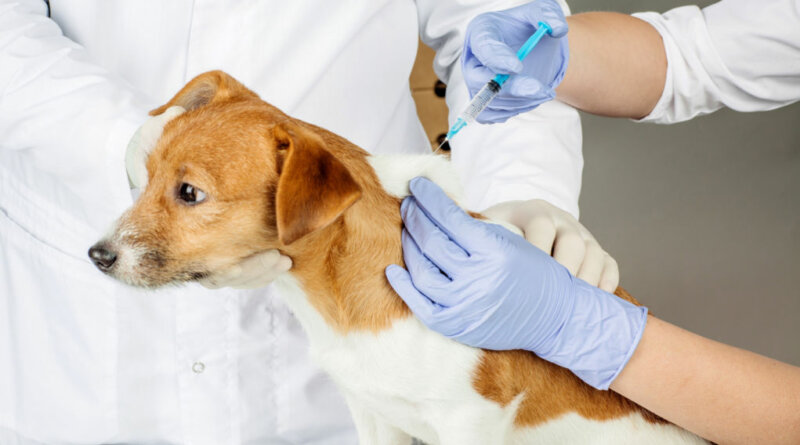Does Pet Insurance Cover Vaccines? Things You Need to Know
As responsible fur parents, we keep up with the routine vaccination schedules of our pets to ensure their safety, health, and well-being.
It often leaves us wondering, “does pet insurance cover vaccines?”
Vaccines ensure the health, safety, and well-being of our beloved pets. However, regular vaccination for pets comes at a cost.
This is where getting pet insurance becomes essential, not just for our pets but also for our financial well-being.
Whether you have already enrolled your pet in an insurance plan or are still considering getting one, you may have wondered about the cost of routine vaccinations and what does pet insurance covers.
Let us find out!
Does Pet Insurance Cover Vaccines? An Overview
Before purchasing a pet insurance policy, you must understand that most standard plans do not cover vaccinations since they are part of your pet’s routine wellness.
Some pet insurance plans offer wellness coverage add-ons at an additional cost.
Wellness plans cover some of your pet’s routine veterinary care and treatments, including:
- Vaccinations
- Annual exams
- Heartworm testing
- Spaying or neutering procedures
- Tick and flea prevention
- Microchipping
However, the cost depends on the items covered by the wellness insurance plan add-ons.
Related: Do You Need Pet Insurance?
What Vaccinations Are Covered With Pet Wellness Insurance Plans?
One of our top responsibilities as fur parents is ensuring that our puppies get their first vaccinations during their 8th to 10th week of life. They receive their second dose two to four weeks later.
The veterinarian will administer the puppy vaccine through the scruff of the neck. On the other hand, the kennel cough vaccine comes in the form of nasal drops.
Ensure your pets get vaccinated for the following diseases:
Puppy Vaccines
Canine parvovirus (CPV)
This fatal and highly contagious disease affects the gastrointestinal system.
Puppies aged between six to 20 weeks are most susceptible to canine parvovirus.
Most puppies tend to show the symptoms of CPV within 3 to 7 days.
- Severe, bloody diarrhea
- Lethargy
- Anorexia
- Fever
- Vomiting
- Severe weight loss
- Dehydration
- Red, inflamed tissue around the eyes and mouth
- Rapid heartbeat
- Pain or discomfort
- Hypothermia or low body temperature
Leptospirosis
This bacterial infection affects both humans and animals. Leptospirosis can be transmitted through contaminated water and infected urine.
Among the most common symptoms of Leptospirosis include the following:
- Fever
- Vomiting
- Abdominal pain
- Diarrhea
- Lack of appetite
- Lethargy
- Stiffness
- Severe muscle pain
- Infertility
The bacteria that cause Leptospirosis can spread throughout your pet’s body, causing infection in vital organs, such as kidneys, liver, central nervous system, eyes, and reproductive system.
This bacterial infection can result in permanent organ damage or even death when left untreated.
Canine distemper
This highly infectious viral disease can affect puppies and adult dogs. The canine distemper virus (CDV) attacks your pet’s gastrointestinal, respiratory, and central nervous systems.
CDV can spread through airborne exposure (sneezing or coughing) or sharing food or water with an infected animal.
Unvaccinated puppies younger than four months are the most at risk of the disease.
Stage 1 of Infection:
- Fever
- Clear nasal discharge
- Purulent eye discharge
- Lethargy
- Anorexia
- Coughing
- Vomiting
- Diarrhea
- Pustular dermatitis (rarely)
- Inflammation of the brain and spinal cord
Stage 2 of Infection: Neurological Signs
- Head tilt
- Circling
- Partial or full paralysis
- Seizures
- Nystagmus (repetitive eye movements)
- Muscle twitching
- Convulsions with increased salivation and chewing motions
- Death
While canine distemper is life-threatening, some pets recovering from the disease can develop neurological problems later.
Kennel cough
Also known as “infectious tracheobronchitis,” kennel cough is a highly contagious disease caused by several viruses and bacteria at the same time.
Infected dogs can spread the virus/bacteria through airborne droplets, direct contact (like touching), or contaminated items (toys, food/water bowls).
If your pet has kennel cough, you may notice one or more of these symptoms:
- a strong cough, often with a “honking” sound symptom
- runny nose
- sneezing
- lethargy
- loss of appetite
- low fever
Vaccinations usually take effect a week or two after the second injection, allowing your puppy to come into contact with other pups in dog parks, boarding or daycare facilities, training camps, and dog shows.
Dog Jabs
Adult dogs require annual booster vaccinations to stay protected from diseases. If Fido misses their yearly booster shots, you will likely have him start over on their primary dog vaccines again.
Kitten Vaccinations
Kittens at around nine weeks old should have their first set of vaccinations and will receive their second set when they reach three months old.
Protect your kittens from the following illnesses:
Feline parvovirus (FPV)
Feline infectious enteritis is a highly contagious disease caused by feline parvovirus (FPV), also known as feline panleukopenia virus.
The virus can transmit through direct fecal-oral contact or exposure to contaminated objects, such as food dishes, bedding, floors, and grooming equipment.
Also, FPV can be passed from a pregnant cat to her kittens in the womb, putting them at risk of congenital problems, such as blindness, tremors, and poor coordination.
The most common symptoms of FPV include the following:
- Lethargy and depression
- Frothing at the mouth or vomiting
- Watery discharge from the nose
- Fever in the early stages, followed by a low body temperature
- Watery or bloody diarrhea
- An inability to eat and drink
Feline calicivirus (FCV) and feline herpesvirus (FHV)
FCV and FHV are among the most common causes of cat flu. While it is not fatal to healthy adult cats, FCV and FHV can be life-threatening to kittens and senior cats,
If you think your cat suffers from FCV and FHV, watch out for the following symptoms:
- Fever
- Lack of appetite
- Sneezing
- Conjunctivitis
- Eye and nose discharge
Feline leukemia virus (FeLV)
This is one of the most common infectious diseases affecting cats worldwide. Contact with infected saliva or nasal secretions can spread the disease.
Symptoms of FeLV include:
- Loss of appetite
- Weight loss
- Poor coat condition
- Enlarged lymph nodes
- Persistent fever
- Inflamed gum (gingivitis) and mouth (stomatitis)
- Skin, urinary bladder, and upper respiratory tract infections
- Chronic diarrhea
- Seizures, behavior changes, and other neurological disorders
- Eye conditions
- Abortion of kittens or other reproductive failures
Adult Cat Vaccinations
Like dogs, cats require yearly booster jabs to stay protected throughout their lives.
Also, it would be best to keep up with their annual booster vaccine, or you will pay for their primary vaccinations again.
What Does Pet Insurance Cover
Pet insurance coverage generally includes unexpected accident-related injuries, illnesses, medications, laboratory examinations, and emergency care.
Some pet insurance providers do not even reimburse every expense in those categories.
Often, most insurers only offer three main coverage options to pet parents: accident and illness coverage, accident-only coverage, and wellness coverage.
Let us explore the pros and cons and the insurance coverage of every option:
Accident and Illness Coverage
| Pros | Cons |
| Injuries from accidents | Higher monthly premiums than accident-only coverage |
| Vet-diagnosed illness or disease | Does not cover routine care, such as regular vet check-ups and teeth cleanings |
| A good option for breeds that frequently experience health problems | Limited reimbursements per accident and per illness |
| May include an optional wellness rider for an additional cost |
Coverage Includes:
- Vet check-ups, consultation fees, hospitalization, treatments, surgery costs, and prescription medications.
- Breed-specific hereditary and congenital conditions, like torn ligaments.
- Specific conditions, but only if the treatment happens at least six months after the policy takes effect.
- Cancer and specialty care of any kind
Accident-Only Coverage
| Pros | Cons |
| More cost-effective monthly premiums | Covers only accident-related injuries |
| The best option for young, healthy pets with less risk of hereditary conditions | Illness treatment and routine care are still out-of-pocket expenses |
Coverage Includes:
Reimburse the treatment cost for illnesses and injuries caused by accidents, whether self-inflicted by the pet or the owner’s fault.
- Motor-vehicle accidents
- Ingesting foreign objects
- Sprains and lacerations
- Fractured bones
- MRIs and x-rays for diagnostic
Wellness Coverage
| Pros | Cons |
| Provides reimbursement for preventative (routine) care | Not the usually autonomous policy but an add-on or rider |
| Usually has a zero deductible |
Coverage Includes:
- Vaccination
- Flea/tick and heartworm preventatives
- Microchipping
- Broken Bones
- Spay/neutering surgery
Annual Cost of Pet Vaccinations
When choosing a pet insurance provider, one critical question is, does pet insurance cover vaccines?
While vaccines are crucial for your pet’s health, annual pet vaccination often comes with a cost. Its annual fee depends on various factors.
Some pet parents only choose vaccines the law requires, but others provide extra protection.
Unfortunately for dog owners, their unvaccinated pets are more at risk of various health threats.
Make a significant difference in your dog’s health by ensuring your pooch gets annual vaccination. Fatal canine diseases often require expensive treatment, costing you hundreds of dollars in veterinary care.
Be sure to choose pet insurance that covers shots to help you save money in the long run.
Puppy shots
Puppies should get vaccinated at six weeks, 12 weeks, and 16 weeks after birth. Complete vaccination packages can typically cost between $75 to $100.
DHLPP
This vaccination helps protect Fido from fatal canine diseases, such as distemper, hepatitis, leptospirosis, parvo, and parainfluenza.
The annual vaccination shot costs about $40 to $75.
Rabies shot
Most states require dog and cat owners to vaccinate their pets against rabies. Rabies shots are effective for three years, costing about $20 to $50.
Bordetella
This vaccine helps protect your dogs against kennel cough. Its average annual cost is between $40 to $65.
How Pet Insurance That Covers Shots Help You Save Money
Choosing the right pet insurance can be a lifesaver.
There is no telling when or how your pet will get sick or how much the cost of the treatment will be.
Now that you know the answer to your question, “does pet insurance cover vaccines?” be sure to find the best pet insurance provider that offers a wellness plan that includes vaccinations to protect yourself against unexpected veterinary bills.
Our pets’ lives are full of uncertainties. Despite keeping them safe at all times, our pets may accidentally ingest foreign objects or get injured while climbing and stumbling off shelves.
It is our responsibility to mend them back to health. Having them insured enables us to take care of them without financial burden.
More pet owners are choosing to get their pets insured. According to the North American Pet Health Insurance Association, about 4 million dogs and cats in the United States got insured in 2021, showing a 28% increase from the previous year.
Quick Pet Insurance FAQs
What vaccinations are covered with pet wellness plans?
While most pet insurance providers do not cover routine vet care, some offer optional wellness plans covering rabies, DHLPP, DAP, bordetella, Lyme, influenza, and FVRCP (for cats).
Is it illegal not to have pet insurance?
While the state requires certain vaccinations for your pet, no law requires pet owners to obtain a pet insurance policy.
What does pet insurance not cover?
Unfortunately, pet insurance has more restrictions than human health insurance.
The most common things the pet insurance policy does not cover include pre-existing conditions or injury, pregnancy and giving birth, routine or preventative care, administrative costs, and exclusion or waiting period.
What is the best insurance plan for my pet?
When choosing the ideal insurance plan for your pet’s needs, we recommend researching and comparing various options to help narrow your choices.
Related: Pet Insurance: A Beginner’s Guide
The Bottom Line: Does Pet Insurance Cover Vaccines?
If you are still wondering, “does pet insurance cover vaccines?”
The answer is, unfortunately, no.
However, you do not need to worry if the pet insurance provider does not include routine care, such as yearly health examinations or regularly scheduled vaccinations.
To receive preventative care, you must pay for a wellness plan as an add-on to accident and illness coverage or as a standalone product.
You do not have to worry about routine pet vaccinations. Simply add a wellness plan to your pet insurance coverage.
Consider essential factors, such as your pet’s age and health care needs, when shopping for the best pet insurance policy.
Do you have any more suggestions to share about pet insurance and vaccines? How did you choose your pet insurance?
Feel free to share them with us in the comment section below!
Read Next: Pet Insurance vs. Pet Savings Account: Which One’s Better for You?









